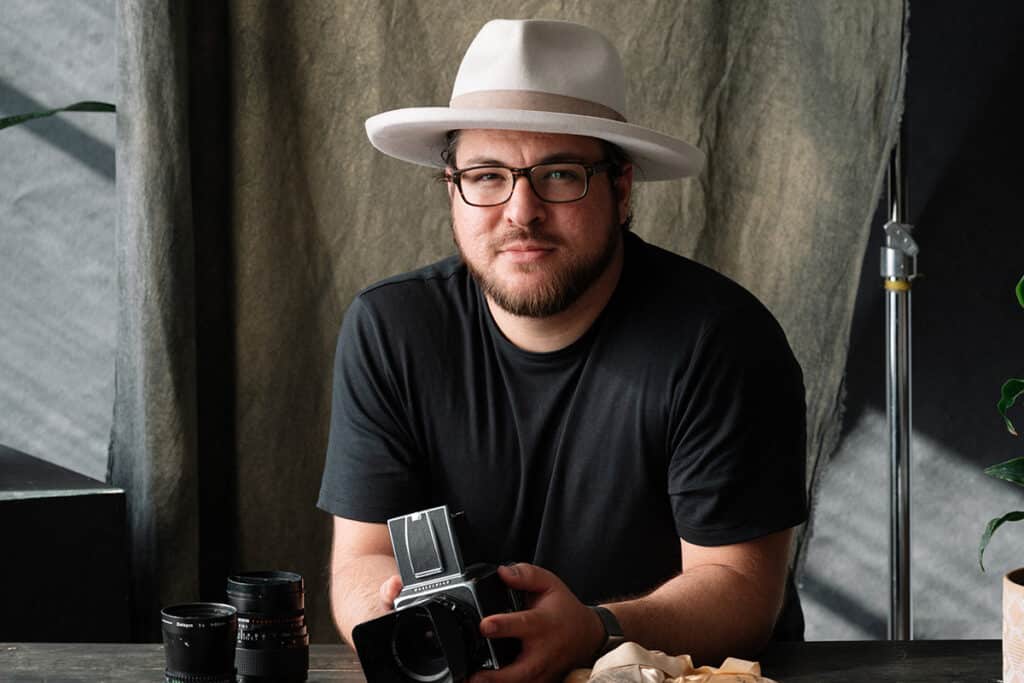According to AARP, 7.8 million American children live with relatives other than their parents, and5.8 million of those live with their grandparents. In fact, this number has been rising steadily over the past four decades and has attracted the attention of social scientists and various social agencies. In Bexar County, more than 18,000 grandparents have assumed the parental role.
We have three real-life stories that are both sad and joyful — sad because the biological parents were either unable or unwilling to raise their own offspring but also heartwarming because loving grandparents stepped in, ready to sacrifice again for a new generation of children.
Suddenly We Had a Baby to Raise
Marisol and Alonzo Whittington were looking forward to their empty-nest years. The couple had started a commercial cleaning business in 2011, and Marisol was also pursuing a college degree at Texas State in addition to holding another job as senior contract manager with Sodexo, an international company that offers food and facility management services for a variety of institutions. To relax, they liked to ride motorcycles and explore new restaurants. Most of their children were adults and on their own with the exception of the youngest, Arianna, who still is a college student.
Then one day, Alonzo’s oldest son from his previous marriage showed up on their doorstep with his girlfriend and a baby boy in tow, saying he wanted to introduce the boy to his grandparents. That visit soon led to others, with baby Estevan spending longer and longer periods with the Whittingtons without his parents. Marisol and Alonzo eventually learned that Child Protective Services (CPS) had been visiting the younger couple’s apartment for some time to monitor the child’s care and safety. Their lifestyle and perennial financial problems were cause for concern. A few months later, the CPS caseworker, Chireen Mendoza, approached the Whittingtons to see if they would consider becoming Estevan’s guardians. “How could we say ‘no’?” asks Marisol. “The alternative was the foster care system, and I couldn’t live with that. So suddenly we had a baby to raise.” Marisol cannot say enough about Mendoza’s meticulous handling of the situation and the caseworker’s dedication to Estevan’s welfare.
Little Ezo, as Estevan is nicknamed, joined their household in September 2014 at the age of nine months and has been flourishing ever since. When he arrived, he was behind on his vaccinations, had nightmares and suffered from asthma largely because his parents smoked nonstop, explains Marisol, but all of these problems have since been resolved. Marisol set up a cozy room for him in their comfortable Garden Ridge home, and life changed for everyone. Today, the family’s routine revolves around Ezo’s schedule. Fortunately, Arianna and other relatives are happy to help, surrounding the now 18-month-old with love and attention.
“He brings us so much joy,” notes grandma, who is actually his step-grandmother. “You teach him a new word, and you get so excited about that. He comes and hugs you, and it’s so heartwarming. He’s a very good boy and smart as a whip.”
Though we often think of grandparents as older, Marisol is only 44 and her husband, 54. They are thankful that they still have the energy to rear their grandson to adulthood, especially since they made the decision to officially adopt him. The new familial relationship can get a bit confusing when little cousins come over to play, but it’s too early for explanations at this time. Marisol and Alonzo have become Mama and Papa, and they are leaving it at that. While the biological parents are not exactly banned from visiting, few visits have taken place, which Marisol believes is better for the child.
She sees her second parental career as an opportunity to do an even better job than with her own kids. “You learned from your experiences with your children,” she explains. “I think my children were somewhat spoiled. For instance, both wanted brand-new cars at 16, and both got them. I don’t want to repeat that mistake. Maybe Ezo will get a job to help pay for his car, and maybe it doesn’t have to be a new car. And there will be no video games all the time. We are better at this parenting game now. We are very nurturing, but we also believe in disciplining children. So with Ezo we can start right.” It also helps to be more financially stable and have familial support, something the Whittingtons did not enjoy earlier in life as they moved from place to place during Alonzo’s military career.
We break our conversation to take a look at Ezo’s room, freshly decorated with blue carpeting and walls and toddler toys galore. In his closet, perfect little outfits are lined up on the low rod. Despite the talk about not indulging kids, the new mom admits that it’s hard to resist buying the cute clothes. He’s the best-dressed kid in his day care, she confides, laughing. Now that they are parents again, the spouses find themselves entertaining all the concerns and worries that parents normally have about schools, extracurricular programs, starting a college fund, involving him in sports, entertaining his little friends, etc. “My husband and I are very excited and a little scared,” she admits. And she offers advice to other grandparents in similar situations: “Be prepared. It’s hard work, but the rewards outweigh the sacrifices. We need to step in and raise our children to be responsible adults; otherwise the consequences propagate down the line.”
Guiding A Teenager
One of the first things Jean French tells me about her 16-year-old grandson, Patric, is how handsome and charming he was during a recent social occasion when he acted as escort to “princesses” at the Fiesta Teen Queen Coronation, an event sponsored by the Woman’s Club of San Antonio. “This was the first time he’s ever done anything that formal,” notes the proud grandma, who is the club’s president. “Everybody liked him. I could see him blossoming.”
Patric came to live with Jean and her husband, Jack French, in January of 2014 after his mother, Jean’s daughter, suffered both health and financial troubles and could no longer support her son. His father, who works in Afghanistan, visits for a few weeks every summer and pays child support. “When Patric first came to us, he didn’t laugh and he didn’t talk much,” says Jean. “He was kind of beaten down. He didn’t have social skills. But he’s learning fast. The teachers tell me that he’s sociable at school, and now when I give him a hug, he hugs back, and when we walk on the street, he holds my hand. Little by little, he’s getting more comfortable. I want him to have a normal life of a teenager, but I don’t push hard. He still has some catching-up to do.”
 While he was often left to his own devices in the past, life in the French household offers structure, expectations and a dose of discipline. There are chores to do, church to attend on Sundays, and dinner is a family affair every night. Jack is teaching the teen how to mow the lawn and trim the hedges so grandpa and grandson can spend time together. There’s no skipping school, and this summer Patric will be encouraged to find a part-time job like so many others his age. In the last year-and-a-half his school grades have considerably improved, and he seems to be warming up to church services as well. Grandma’s heart was gladdened recently when she heard him join in the singing. She made no big deal about it, but she knew that something had changed.
While he was often left to his own devices in the past, life in the French household offers structure, expectations and a dose of discipline. There are chores to do, church to attend on Sundays, and dinner is a family affair every night. Jack is teaching the teen how to mow the lawn and trim the hedges so grandpa and grandson can spend time together. There’s no skipping school, and this summer Patric will be encouraged to find a part-time job like so many others his age. In the last year-and-a-half his school grades have considerably improved, and he seems to be warming up to church services as well. Grandma’s heart was gladdened recently when she heard him join in the singing. She made no big deal about it, but she knew that something had changed.
Because Patric will be with them a relatively short time before becoming an adult, the Frenches have not formally adopted him. However, Jean has the necessary power-of-attorney documents to deal with medical and financial issues that may arise. She and Jack also plan to help with his college expenses. “Next week, I’ll make an appointment with the school counselor to make sure he’s on the right track for college,” she notes.
This is not the first time that Jack and Jean have offered a helping hand to a family member. They took care of Jack’s elderly parents for 14 years and often hosted Jean’s adult children – and their offspring – for prolonged periods of time. At one time all three of her grown children lived with them. Jean gives credit to her husband, her children’s stepfather, whom she describes as “the salt of the earth. He has been the rock we all lean on.”
When Patric joins us after school, he’s polite and pleasant but not very talkative. Jean tries to draw him out by asking about school and some tests. I eventually find out that his favorite subject is math, and I already know from grandma that he loves console games. He’s willing to take me upstairs to the entertainment room, where he spends lots of time playing those games. Someday he may want to design or test them.
Does he like living here, with his grandparents? I ask. “It’s good,” comes the brief answer. But then he amplifies: “They make me laugh sometimes… I feel loved and taken care of.”
To keep the conversation going I ask him what surprised him the most in this new life. He doesn’t hesitate on that one: “What surprised me is how much my grandma goes out.” Jean and I both laugh. Calling herself “a professional volunteer,” Jean has served on a number of community organization boards and has been president of six of them. Her responsibilities keep her busy and on the go. But that kind of volunteer work is unfamiliar to her grandson.
During our three-way conversation, she calmly tells Patric that he can express anger if he feels angry, that she wouldn’t mind. He nods, noncommittally. She also would like him to know that his school friends are welcome to come to the house. But Patric shakes his head “no.” Though his friends know that he lives with grandparents, he’s clearly not ready to invite them over. He either can’t or is not willing to explain why. When he bolts upstairs to the game room, Jean and I spend a little time talking about her community projects and the family’s summer plans. “We have lots of plans for the summer — the zoo, the Carlsbad Caverns, the Witte Museum, a teen group at our church, car shows… he loves watching car shows!” she exclaims, her voice rising in excitement.
After Tragedy, New Hope
David and Lydia Lerma have had a lot to deal with in the past couple of years. Back in March 2013, their beautiful 27-year-old Sarah fell ill and was hospitalized with what Lydia describes as infected ulcers. That was the beginning of months of repeated hospitalizations, which eventually led to open-heart surgery and the insertion of a pacemaker. “She survived with the help of her strong will and prayer,” says Lydia with tears in her eyes. “She felt so much better when she was released September 17.” And then, about a month later, Sarah’s parents got the call every parent dreads. Their daughter was in the emergency room, having suffered a blunt trauma to the head. The doctors were not hopeful. Some days later they had to make the gut-wrenching decision to pull the plug on their youngest child, without ever learning how she had been injured. The grieving parents were left without even the consolation of closure.
 Sarah left behind two children, David and Emerie, now 4 and 9, respectively. Since the children were already living with the grandparents during their mom’s illness, it was only natural for them to stay there after her death. Like the Whittingtons, the Lermas couldn’t possibly let them go to an orphanage or into foster care. These were their babies. “David calls me both Nana and Mama, and he calls my husband Dada,” explains Lydia. “When he sees me crying, he comes to me and asks, ‘Are you crying because of Sarah?’ He tries to console me. Emerie, who was 7 when her mom died, is very angry. She and her mom were very close. She won’t talk to me (about her feelings), but she now goes to therapy. Fortunately, she likes going to therapy.” And the little girl is scared of losing her grandparents. Lydia describes how during a recent storm, she tried to reassure the shaken Emerie that she, Lydia, would protect her should the house get damaged. “But what if you die?” asked the child. “I don’t want you to die.”
Sarah left behind two children, David and Emerie, now 4 and 9, respectively. Since the children were already living with the grandparents during their mom’s illness, it was only natural for them to stay there after her death. Like the Whittingtons, the Lermas couldn’t possibly let them go to an orphanage or into foster care. These were their babies. “David calls me both Nana and Mama, and he calls my husband Dada,” explains Lydia. “When he sees me crying, he comes to me and asks, ‘Are you crying because of Sarah?’ He tries to console me. Emerie, who was 7 when her mom died, is very angry. She and her mom were very close. She won’t talk to me (about her feelings), but she now goes to therapy. Fortunately, she likes going to therapy.” And the little girl is scared of losing her grandparents. Lydia describes how during a recent storm, she tried to reassure the shaken Emerie that she, Lydia, would protect her should the house get damaged. “But what if you die?” asked the child. “I don’t want you to die.”
While we are talking, little David pops in and out of the room, looking vigorous and happy like any 4-year-old. His sister joins us later when Grandpa David brings her home from school. Emerie is a good student, likes gymnastics and swimming and is good at art, like her grandmother, who’s an accomplished artist.
A retired police officer, (big) David is thankful that his colleagues rallied around the family and helped both when Sarah died and a year later when another misfortune befell the family. Their home of many years in the Jefferson neighborhood caught fire one day, causing enormous damage. Fortunately, no one was in the house at the time. “After the fire, I got more than 90 calls from the (San Antonio Police) Officers Association,” he recalls. “The Association’s Benevolent Fund helped us a great deal financially. We also received help from Aerial Athletics, where Emerie goes to gymmastics. The owners gave a generous donation and 12 new leotards for Emerie and other clothes for the children.” His police buddies showed up in numbers for Sarah’s funeral, as well, though David hadn’t told anyone about her death. Then-Chief William McManus saluted Sarah in her coffin. “The (police) department is a brotherhood, a very tight group, very helpful,” notes David.
With the assistance of attorney Margaret Preismeyer, whom they also praise, the Lermas started the adoption process as soon as they were able to regroup a little. David says he didn’t want to deal with the biological father, child support “and broken promises.” And it was also a way to obtain medical insurance for the youngsters and all the privileges of parenthood. While Lydia worries about her age and staying healthy enough to see her “babies grow up,” David has a different attitude. “I don’t think about it,” he states.
“I pray that everything will be OK with my children, and I put my worries on Christ. He is in charge. I just go. That got me through all of this. It’s been rough … Emerie and I pray every morning on our way to school, and (little) David is catching on.”
Both grandparents work hard to make life not only normal but active and enjoyable for the kids. David takes them to the park, bicycle riding and on short trips to the coast; Lydia provides a loving home and helps with homework. “I may have to go back to school to relearn algebra,” she quips, “but I have been able to get by so far.”
Like the Whittingtons, the Lermas had hoped to enjoy retirement and do some traveling. But as David puts it, “Man proposes, God disposes,” meaning the best-laid plans may go astray, and one has to adapt to changed circumstances. The children are now the focus of their lives. “We’ll provide for them no matter what,” says Lydia.
If you have the primary responsibility for your grandchildren, the Bexar Area Agency on Aging can be a useful resource. Call 210-477-3275 or go to www.aacog.com.




